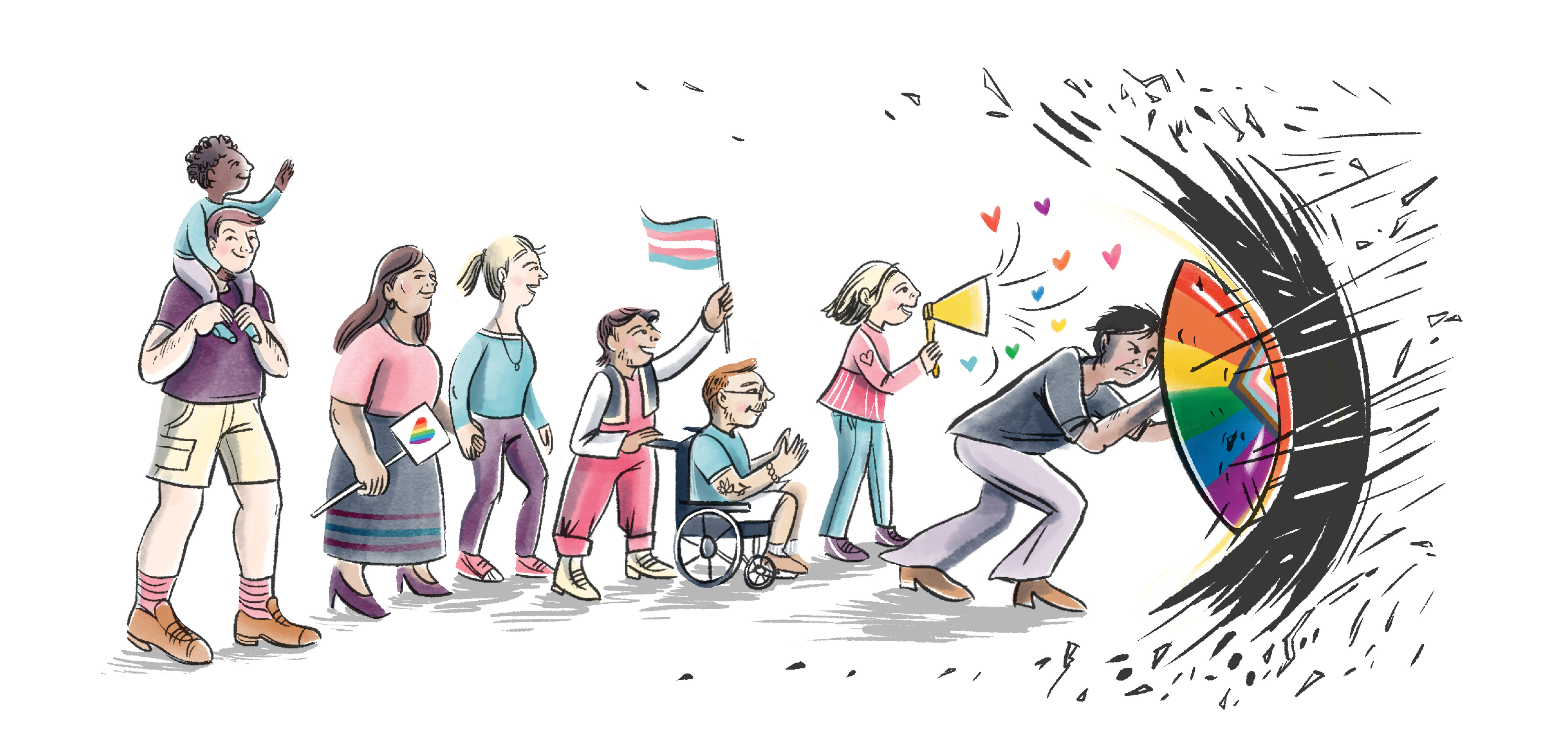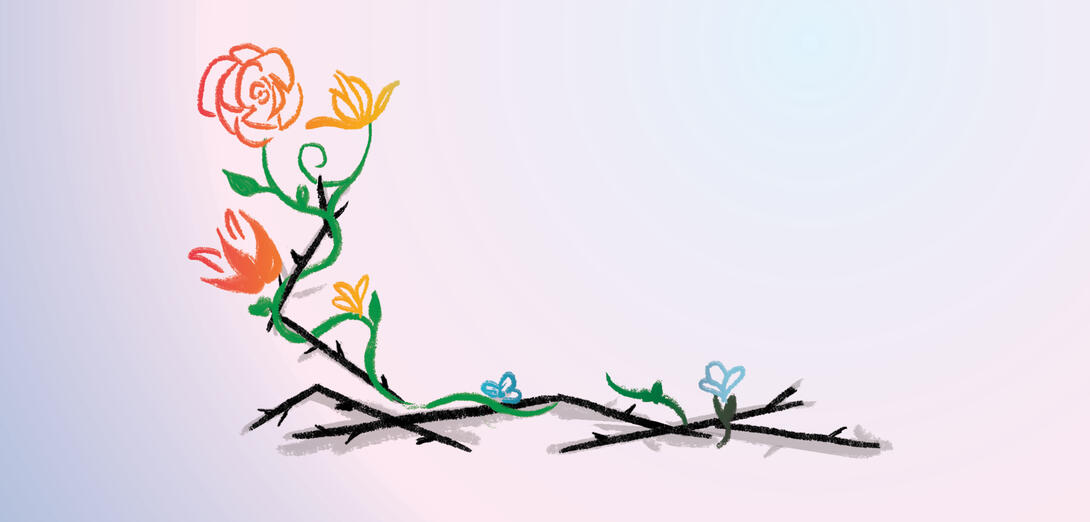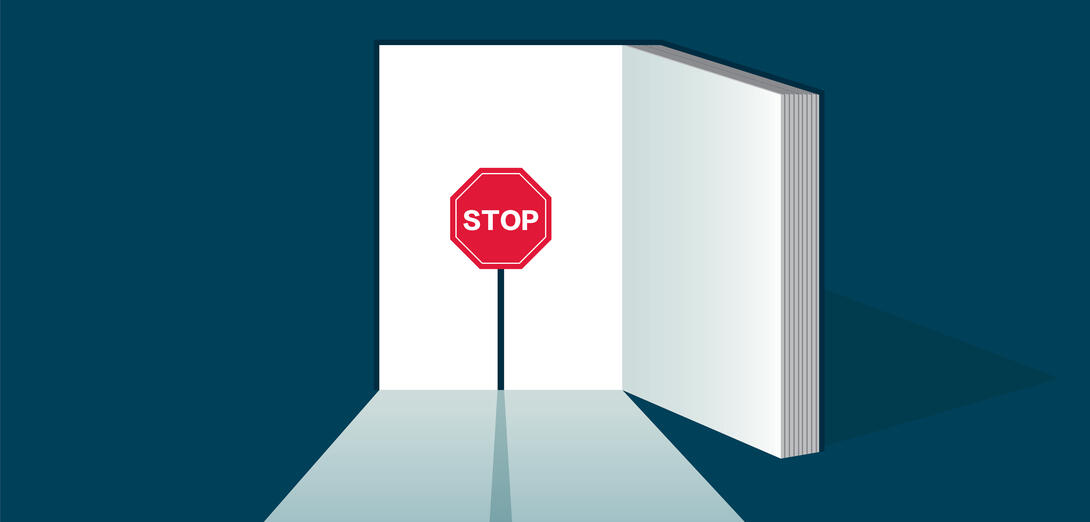There is a picture of seventeen-year-old me on the wall in my high school, class of 1987. I have a spiral perm and I am wearing my favourite sweater. I look very much like the other girls I graduated with. Same shellacked hair, same sparkly blue eyeshadow.
But I wasn’t. I was wearing a costume in order to survive and escape.
I grew up in a Catholic family in the Yukon in the seventies and eighties, and even though I was loved by my giant family, I was lonesome. I knew since forever that I was not like the other little girls at school somehow, and I could not imagine growing up to be like my mom or my aunts or my grandmothers, no matter how much I loved and respected all of them. In the songs I heard, in the movies I watched and in the many books I read, I never heard mention, or even caught a glimpse, of anyone else like me.
Coming out in high school back then didn’t feel anything close to possible. I didn’t even know any queer adults. I had no role models, no road map, no history, no evidence.
When I first started to write stories and publish books, I wrote them for that lonely, teenaged me. I wrote my history down, and imagined and invented a future for myself so I might be found, or followed.
The first time I was invited to come and read my work in a public high school, well over 20 years ago now, I swallowed all my teenage ghosts and high school hallway memories and went, knowing what it would have meant to a younger me to see and hear a real live queer and trans person stand up in my school library and tell a true story about themselves, what it would have meant back then to have been gifted with any possibility of a future me.
Over two decades later, I have now published 13 books and have performed for more than half a million middle and high school students, in many different countries, and on five continents. This is not easy work. Compared to a soft-seat theatre full of consenting adults with paid tickets in their pockets, school shows are a grind. I do this work because it is important. Because every single one of us, no matter who we are, need to see a reflection of ourselves in the world around us. And for queer and trans kids who might be forced out of their families, homes, schools or communities by the current rising tide of hate and misinformation, this work is even more important and vital.
Mic drop
Back in 2018, I went to Vernon B.C. on a four day tour of schools that would culminate in an evening of storytelling for parents in the district. A couple of hours before the evening gig, the principal who had organized the tour called me.
“Just a heads up,” she said, “we’ve just been warned by the police that there might be a protest tonight at your show. A conservative parents’ group might picket outside and try to disrupt your performance.”
“Try not to worry about it. We’ve asked for a visible security presence in the school, and police are alerted and will be in the area. Let’s go with the business-as-usual strategy,” she said, using her best principal voice.
So I tried not to worry about it, and I told stories to about 400 parents in a school gymnasium that night. Turned out there were no protestors outside, and nobody disrupted my performance. In fact, we had a pretty fun time, until the question-and-answer session at the end.
A thin woman stood up and told me that she had come that night expecting to have a problem with my stories. That she had kept her kids home from school the previous day so they wouldn’t be exposed to my ideas. That she was expecting to be offended by me and had planned to stand up and march out tonight in protest, but she hadn’t. She said I actually seemed like a nice person, and that she was sorry that I was going to burn in hell for eternity.
She said she believed trans people are a scientific accident, that our mothers had been exposed to toxic chemicals while we were in the womb, chemicals found in lead paint, or that had leached into food from the lining of tin cans and Jiffy Pop. Jiffy Pop popcorn was full of stuff that could cause birth defects such as transsexuality, she informed the gobsmacked room, and that chemically altered trans people shouldn’t be allowed around children because we could give them ideas about themselves, ideas that could spread, and did I think I was a toxic chemical trans, or did I catch it from hearing trans ideas somewhere?
A man in the front row stood up and asked if he could address her question. Normally I would never do what I did next, which was remove the microphone from the stand and walk over and hand it to the big bearded guy standing in the front row, but I knew this particular man. He was with his very pregnant wife and their five-year-old daughter, who just happened to be wearing a frilly pink dress and a tiara. I knew this man, and I trusted him.
He took the mic from me and turned to face everyone. He said his name was Laoh and explained that he had just moved to Vernon with his wife and young family. He was a nurse, he said, and a trans man. He said that, to his knowledge, his mother had never eaten any Jiffy Pop when she was pregnant with him, but she had made her home very unsafe for him when he came out, and that he had had to leave home as a result. He explained that his teenage years had been hell. He told the crowd that if he could have made himself straight instead of trans he would have, as a survival tactic. If there had been an easier road he would have taken it, he said.
He said he hoped with all of his heart that none of the woman’s kids were queer or trans because she was obviously not able to reconcile her hate enough to be a loving parent. But that was okay, because her kids would find people like him, and me, in the world who would be there to love and support them even if she could not. We would step up and take care of her children if she couldn’t or wouldn’t. Then Laoh sat back down.
Talk about a mic drop.
Unfortunately, things feel worse or us now than they ever have. The clock has not only stopped but has been rewound by decades.
In 2018, I could laugh about that woman and her Jiffy Pop theories, because we were moving forward, making progress. Back then I thought that woman and her hateful pseudoscience were an anomaly, not an omen. Unfortunately, things feel worse for us now than they ever have. The clock has not only stopped but has been rewound by decades.
Losing ground
I just read this back to myself and wondered, did I just write rewound as in wind back, or rewound as in wound again? For me, the answer is both. We have gone back in time, and all of that hurt is happening again, only worse now, because for a while we were given glimpses of a better time, a more loving world, and then they were snatched away and replaced with bathroom bills and protests and vitriol and fearmongering.
The crowds that we see increasingly protesting in our streets are advocating for queer and trans youth to be as lonesome and afraid and closeted at school as they may be at home. These people are willing to fight to force queer and trans kids to remain closeted and unsupported rather than giving them the chance to live authentically for a few hours a day.
These are hard times to be a teacher. I did seven high school presentations last week and came home every afternoon exhausted, and reminded again of how much heart and energy it takes to stand up in front of a group of teenagers and hold their attention.
We cannot cave to political pressure and force ourselves and those kids back into a political closet.
But we have to continue to do this work. It is not hyperbole to say that providing a trans or non-binary kid with a safe place to learn is a life-changing act, and quite possibly a life-saving one. We cannot cave to political pressure and force ourselves and those kids back into a political closet.
I want to close with the words of Leslie Feinberg, the blue-collar author of Stone Butch Blues, which was the first book I ever picked up and truly found a version of myself in. Feinberg writes: “I’m not saying we’ll live to see some sort of paradise. But just fighting for change makes you stronger. Not hoping for anything will kill you for sure. Take a chance. You’re already wondering if the world could change. Try imagining a world worth living in, and then ask yourself if that isn’t worth fighting for. You’ve come too far to give up hope.”
About the author
Ivan Coyote (they/them) is a celebrated storyteller, filmmaker and performer from Whitehorse, Yukon. Their books have received numerous awards, have been included on the long list for Canada Reads and have been nominated for the Governor General’s Award for Non-Fiction. Ivan is the recipient of two honorary doctorates and has served as the writer-in-residence at multiple Canadian universities. Ivan currently works as a specialist in inclusion and creative expression at Yukon University.



